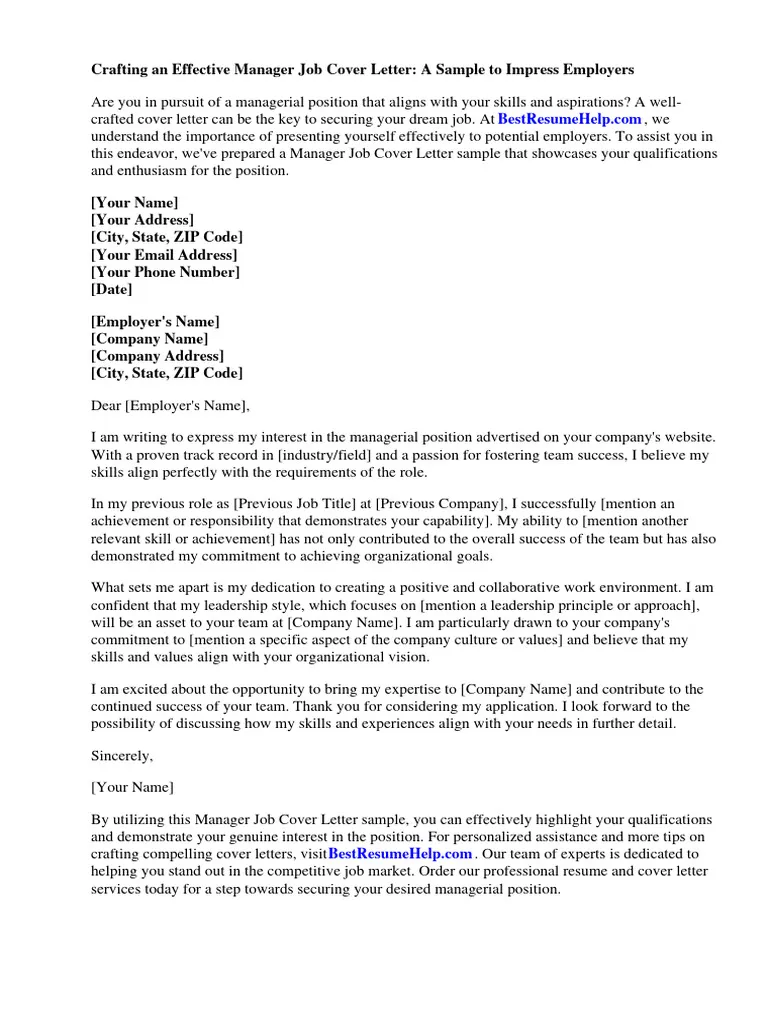The Importance of a Management Cover Letter
In the competitive landscape of job applications, especially for management positions, a well-crafted cover letter can be the key to unlocking your career aspirations. It serves as your initial introduction, a concise summary of your qualifications, and a platform to express your enthusiasm for the role and the company. A cover letter isn’t just a formality; it’s a crucial tool for making a positive first impression and differentiating yourself from other candidates. It provides an opportunity to showcase your unique skills, experience, and personality, all of which are vital for standing out to a hiring manager. Without a compelling cover letter, your resume might be overlooked, and your chances of securing an interview significantly decrease. Therefore, investing time in crafting a standout cover letter is an investment in your future.
Why a Cover Letter is Crucial for Management Roles
For management roles, a cover letter holds even greater significance. It allows you to demonstrate the leadership qualities, strategic thinking, and communication skills that are essential for success in management. Unlike entry-level positions, management roles require a deeper understanding of business operations, team dynamics, and the ability to drive results. A cover letter gives you the space to articulate how your past experiences have prepared you to lead, manage, and motivate a team. It’s your chance to illustrate your vision for the role, how you would approach challenges, and how you can contribute to the company’s success. By highlighting these aspects, you provide the hiring manager with a clear understanding of your potential as a leader and your suitability for the position.
Highlighting Your Management Skills
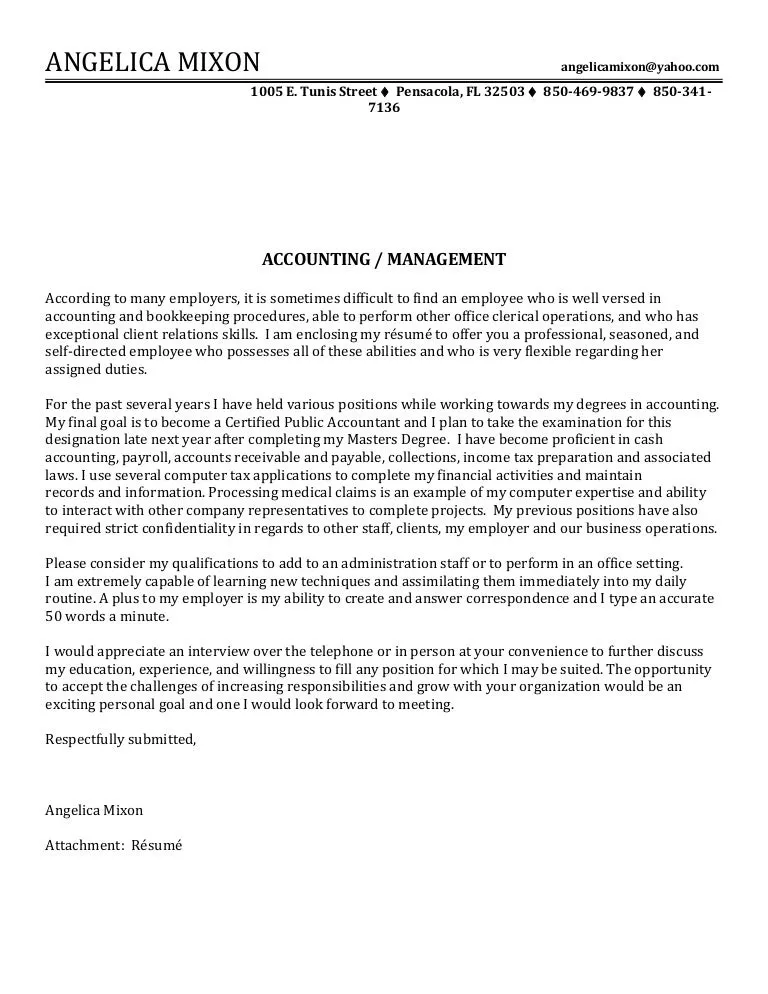
When applying for a management position, your cover letter should be a showcase of your management skills. This includes areas such as team leadership, strategic planning, problem-solving, and decision-making. Describe specific situations where you have successfully led a team, resolved conflicts, or implemented strategic initiatives that resulted in positive outcomes. Don’t just list your skills; provide concrete examples of how you’ve applied them. For instance, if you have experience in project management, outline a project you managed, the challenges you faced, and how you overcame them. If you have a history of team leadership, describe your leadership style and how it helped to boost team morale and productivity. Be sure to include skills that are relevant to the specific management role you are applying for.
Structuring Your Management Cover Letter
The structure of your cover letter is as important as the content. A well-organized cover letter is easy to read and conveys your message effectively. Start with a professional header that includes your contact information. Then, move on to the salutation, opening paragraph, body paragraphs, and closing paragraph. Each section should have a clear purpose, and the information should flow logically from one section to the next. Avoid making the letter too long; aim for one page, unless specifically requested otherwise. Brevity and clarity are key. Use a professional font and ensure your formatting is consistent throughout the document. A well-structured cover letter reflects your professionalism and attention to detail, critical qualities for any management role.
Header and Contact Information
Your header should be the first element of your cover letter. It needs to include your name, address, phone number, and email address. Make sure that the contact details are updated and accurate to ensure that recruiters can reach you easily. You may also include a link to your LinkedIn profile or a professional website, if you have one. The header must be clear, professional, and easy to read. Avoid using fancy fonts or designs that may distract the reader from the content of your letter. The header is a key way of sharing your basic contact details.
Salutation
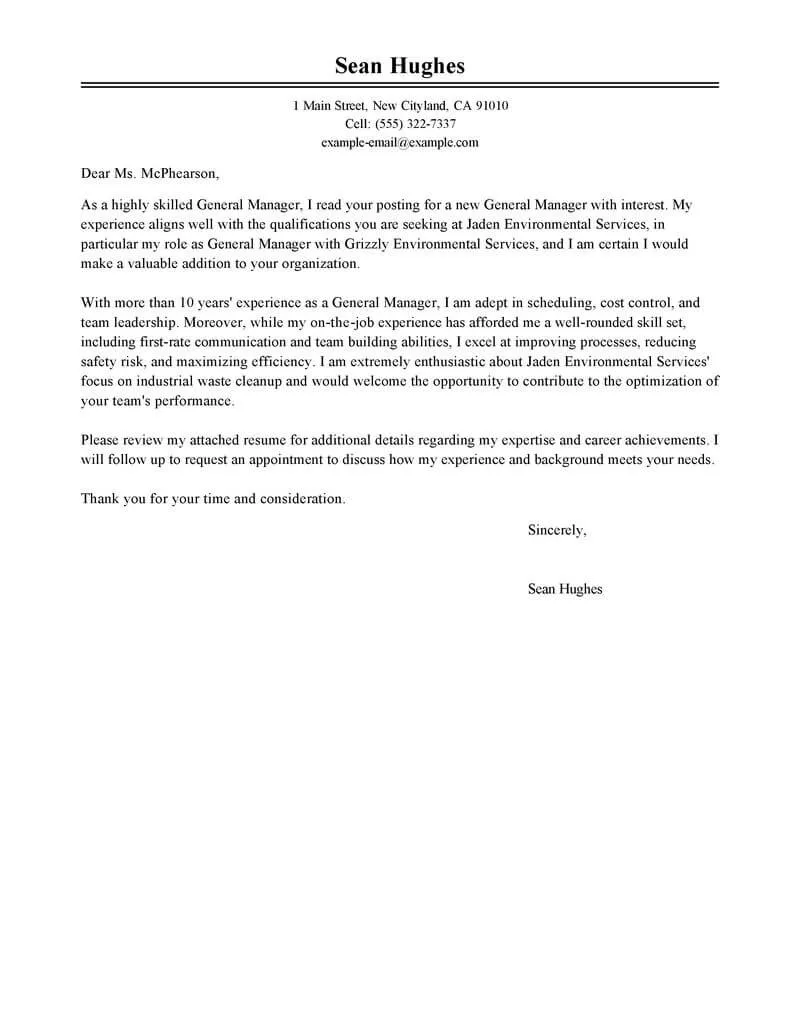
Start your cover letter with a formal salutation. If you know the hiring manager’s name, use it to personalize your greeting; for example, ‘Dear Mr. Smith.’ If you are unsure of the hiring manager’s name, use a general salutation like ‘Dear Hiring Manager,’ ‘Dear [Company Name] Hiring Team,’ or ‘To Whom It May Concern.’ Avoid casual greetings such as ‘Hi’ or ‘Hello.’ Tailoring your salutation to the specific company and role shows that you have done your research and are serious about the position. This personalization can make a significant impact on the reader and show your enthusiasm for the job.
Opening Paragraph
Your opening paragraph is your chance to capture the reader’s attention. State the position you are applying for and how you found out about the opportunity. Briefly mention why you are interested in the role and the company. This is your initial opportunity to show your enthusiasm. Keep this paragraph concise and engaging. Avoid generic statements. Instead, tailor your opening to the specific job description and company values. Showing your research demonstrates that you are genuinely interested in the company. A strong opening paragraph sets the tone for your cover letter, encouraging the hiring manager to continue reading and explore your qualifications more closely.
Body Paragraphs
The body paragraphs are the core of your cover letter, where you detail your qualifications, skills, and experience. Use these paragraphs to highlight relevant achievements and skills, providing specific examples of how you have demonstrated these qualities in previous roles. Each paragraph should focus on a particular aspect of your experience or skill set, such as team leadership, strategic planning, or problem-solving. Use the STAR method (Situation, Task, Action, Result) to structure your examples, which will help you tell a clear and compelling story. Link your skills and experiences to the job requirements, making it clear why you are a good fit for the position. Avoid generic statements. The goal is to make a strong connection between your abilities and the needs of the company.
Highlighting Achievements and Skills
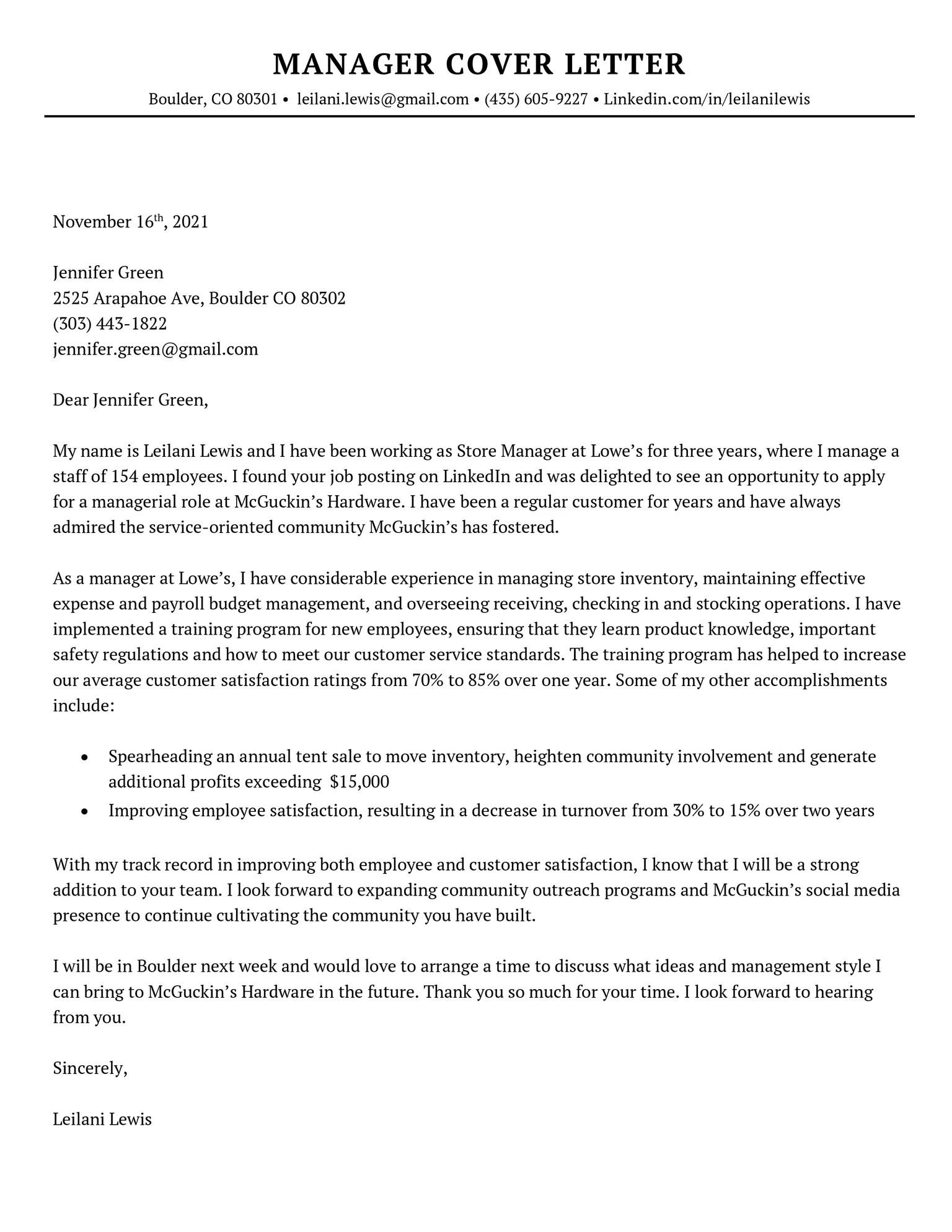
The core of your cover letter should spotlight your achievements and skills. Use specific examples that showcase your accomplishments. Instead of just stating you have leadership skills, describe a time you led a team to achieve a key objective, including the challenges you faced and the actions you took to overcome them. Focus on outcomes. Use quantifiable data to demonstrate your impact, such as ‘Increased sales by 20%’ or ‘Reduced operational costs by 15%.’ Ensure that the skills you highlight align with the job requirements and the company’s needs. This helps the hiring manager understand exactly how you can contribute to their organization. Make sure you give clear and concise information.
Quantifying Accomplishments
When describing your accomplishments, always quantify them whenever possible. Use numbers, percentages, and other metrics to illustrate the impact of your work. Instead of saying ‘Improved customer satisfaction,’ state ‘Improved customer satisfaction scores by 25%.’ Use data that is relevant to the job you are applying for. Providing quantifiable results makes your claims more credible and helps the hiring manager easily understand your achievements. It also demonstrates your ability to measure and analyze performance, a critical skill for a management role. Quantifiable achievements provide solid evidence of your competence and impact.
Demonstrating Leadership Qualities
In your cover letter, you need to show your leadership qualities. Describe situations where you have led teams, motivated employees, or managed projects to success. Discuss your leadership style and how you create a positive and productive work environment. Use specific examples to illustrate your leadership skills, such as how you resolved conflicts, delegated tasks, or implemented new strategies. Mention any awards or recognitions you have received for your leadership abilities. This is the key to showing that you can lead and motivate others. The goal is to make a strong connection between your abilities and the needs of the company.
Closing Paragraph
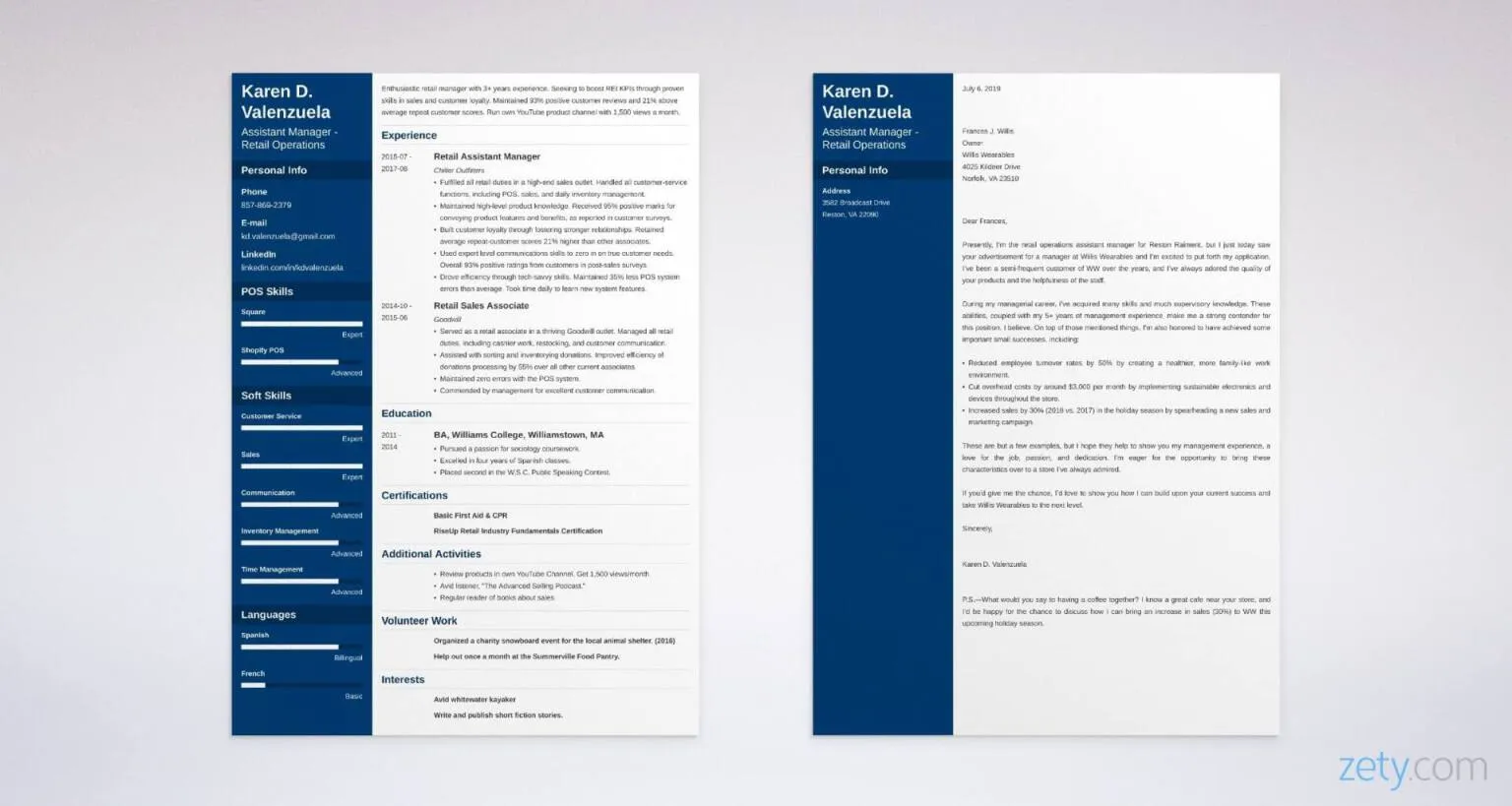
Your closing paragraph should reiterate your interest in the position and summarize your key qualifications. Briefly restate your enthusiasm for the role and the company, and thank the hiring manager for their time and consideration. Express your eagerness for an interview and make it clear that you are available to discuss your qualifications further. Keep your closing paragraph concise and professional. This is your last chance to leave a positive impression, so make sure it reflects your professionalism and confidence in your ability to excel in the role. Avoid using overly generic phrases and end your letter with a strong and positive note.
Call to Action
Include a clear call to action in your closing paragraph. This tells the hiring manager what you want them to do next. For example, state that you are available for an interview and how they can contact you. You can also mention that you have attached your resume for their review and look forward to discussing your qualifications in more detail. By including a call to action, you encourage the hiring manager to take the next step in the hiring process. This can significantly increase your chances of getting an interview. Make sure the call to action is clear, concise, and easy for the hiring manager to follow.
Proofreading and Formatting
Before submitting your cover letter, make sure to proofread it carefully for any errors in grammar, spelling, or punctuation. Errors can create a negative impression and make you look unprofessional. Read your letter out loud to catch any awkward phrasing or typos. Use a grammar and spell checker, but also review it yourself, as these tools are not always perfect. Ensure that your formatting is consistent throughout the document. Use a professional font and maintain consistent margins and spacing. Pay attention to the overall presentation of your cover letter, as a well-formatted letter is easy to read and reflects your attention to detail. Asking a friend or colleague to review your cover letter can help catch errors you might have missed. Make the final revision to ensure your cover letter is free of errors.
Common Mistakes to Avoid
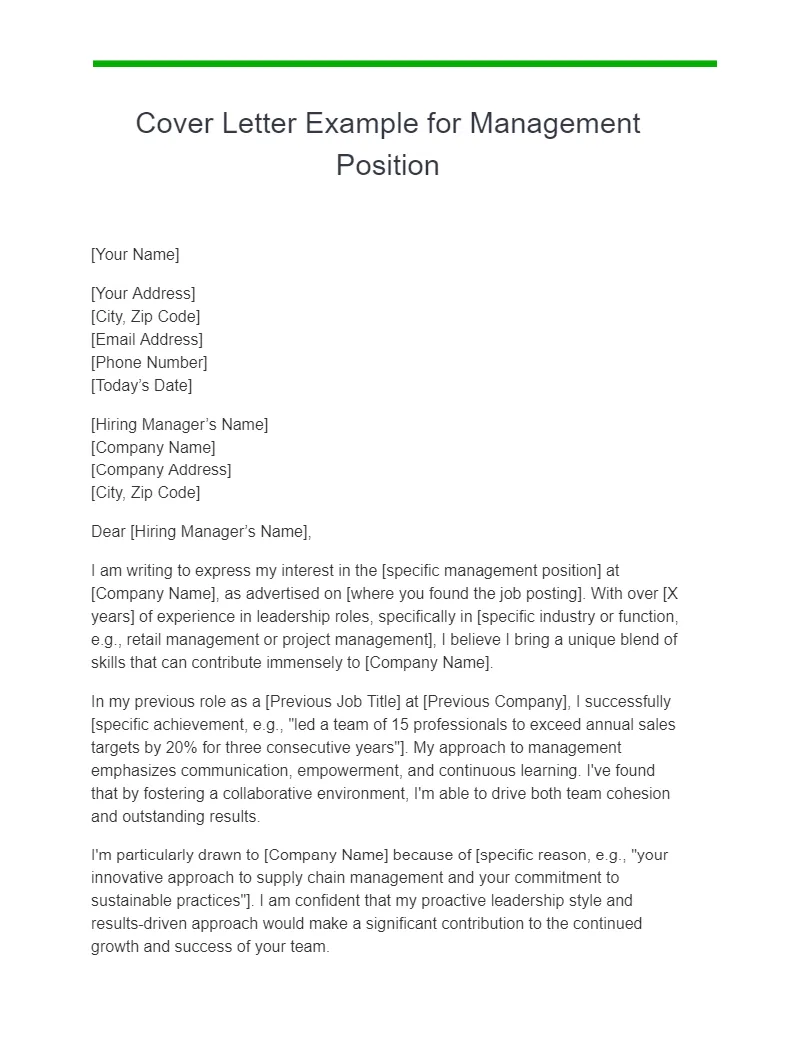
Avoid common mistakes that can undermine your cover letter. Do not use generic or overly long cover letters that are not tailored to the specific job. Avoid grammatical errors and typos. Do not simply repeat your resume; use the cover letter to expand on your accomplishments and skills in a more detailed and engaging manner. Avoid being negative. Always highlight your positive attributes and experiences. Do not use jargon. Stay away from cliches. Make sure your tone is professional and enthusiastic. Make sure the letter is well-organized and easy to read. Reviewing your cover letter carefully for common errors is essential.
Using Strong Action Verbs
Use strong action verbs to describe your accomplishments and skills. Action verbs make your cover letter more dynamic and engaging. Instead of stating you ‘were responsible for,’ say that you ‘managed,’ ’led,’ ‘implemented,’ or ‘achieved.’ Choose verbs that accurately reflect your contributions and the impact of your work. Use a variety of action verbs to keep your writing interesting and avoid repetition. Focus on verbs that showcase your leadership, problem-solving, and strategic planning skills. Make sure the action verbs align with the job requirements and demonstrate your capabilities. A well-chosen action verb helps to convey your message more effectively.
Tailoring Your Cover Letter
Tailor your cover letter to each specific job you apply for. Don’t use a generic cover letter for multiple applications. Instead, carefully review the job description and identify the key skills and qualifications the employer is seeking. Research the company and learn about its values, culture, and goals. Customize your cover letter to demonstrate how your skills and experience align with the job requirements and the company’s needs. Highlight the most relevant achievements and skills, providing specific examples to support your claims. Tailoring your cover letter demonstrates that you are genuinely interested in the position and the company, increasing your chances of getting noticed by the hiring manager. Take the time to tailor each cover letter specifically.
Researching the Company
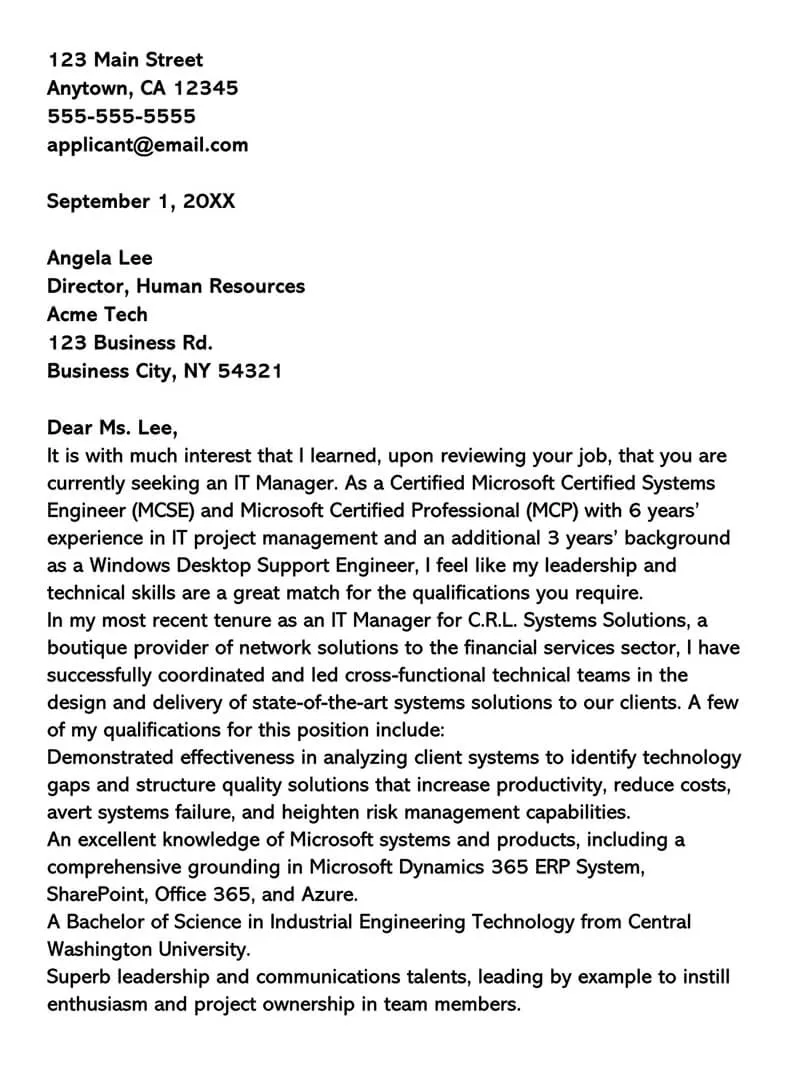
Before you write your cover letter, research the company. Visit their website, read about their mission, values, and recent news. Check their social media pages and see what they are saying about their work. Understand the company’s industry and its position in the market. Researching the company helps you tailor your cover letter to show you understand their business and how your skills and experience can contribute to their success. Show the hiring manager that you are genuinely interested in working for them. Showing that you are ready to join a company is very important. Showing a connection shows you have a level of dedication and understanding that can help you stand out from the crowd.
Matching Skills to Job Requirements
Carefully match your skills to the job requirements outlined in the job description. Identify the key skills and qualifications the employer is seeking and highlight your relevant experience. Use the same keywords and phrases from the job description to make it easy for the hiring manager to see that you meet their requirements. Provide specific examples of how you have demonstrated these skills in previous roles. Quantify your accomplishments whenever possible. Make a clear link between your skills and the specific tasks and responsibilities of the job. Ensure your cover letter emphasizes the value you bring to the company and how you can contribute to their success. Making the match between your skills and the job requirements can increase your chances.
Cover Letter Example for Management Positions
Here’s an example of a cover letter for a management position. (Remember to customize the following example with your information, skills, and accomplishments.)
[Your Name] [Your Address] [Your Phone Number] [Your Email]
[Date]
[Hiring Manager Name, if known] [Hiring Manager Title] [Company Name] [Company Address]
Dear [Mr./Ms./Mx. Last Name, or Hiring Manager],
I am writing to express my keen interest in the Management position at [Company Name], as advertised on [Platform where you saw the job posting]. With [Number] years of experience in management and a proven track record of success, I am confident I have the skills and expertise to excel in this role and contribute significantly to your team.
In my previous role at [Previous Company], I was responsible for [Key responsibilities]. I successfully led a team of [Number] employees, increasing team productivity by [Percentage] and reducing operational costs by [Percentage]. My strengths include strategic planning, team leadership, and problem-solving, all of which I believe align well with the requirements of this position.
I am impressed by [Company Name]’s commitment to [Company Value or Initiative]. I am very interested in bringing my expertise in [Specific Skill] to [Company Name].
I have attached my resume for your review and would welcome the opportunity to discuss my qualifications further in an interview. Thank you for your time and consideration.
Sincerely, [Your Signature] [Your Typed Name]
